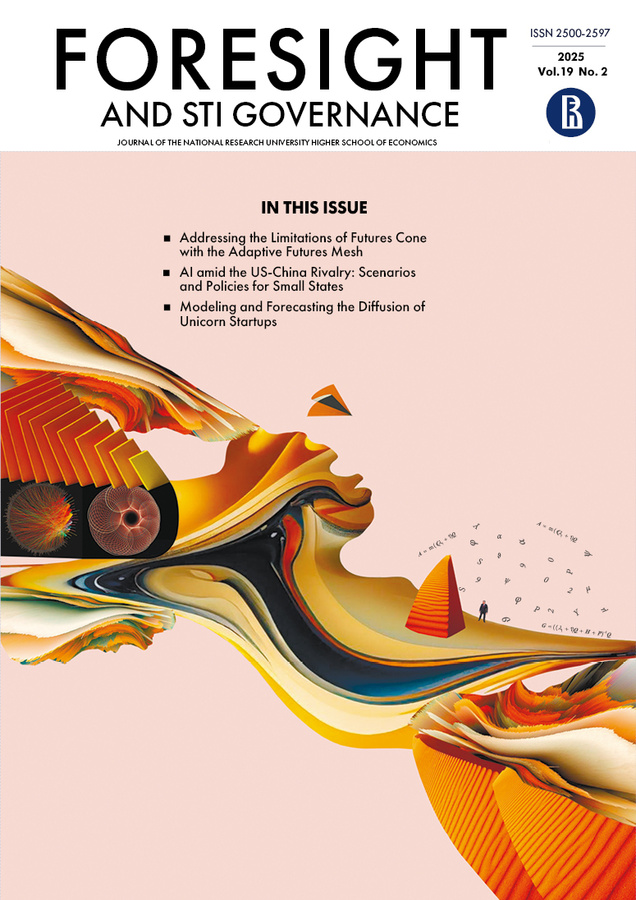Priorities Setting with Foresight in South Africa
- Authors: Pouris A.1, Raphasha P.2
-
Affiliations:
- University of Pretoria
- Department of Trade and Industry
- Issue: Vol 9, No 3 (2015)
- Pages: 66-79
- Section: MASTER CLASS
- URL: https://bakhtiniada.ru/1995-459X/article/view/350360
- DOI: https://doi.org/10.17323/1995-459X.2015.3.66.79
- ID: 350360
Cite item
Abstract
About the authors
Anastassios Pouris
University of Pretoria
Email: Anastassios.pouris@up.ac.za
Engineering 1 Building, Main Campus, University of Pretoria, Pretoria, South Africa
Portia Raphasha
Department of Trade and Industry
Email: PRaphasha@thedti.gov.za
Private Bag X84, Pretoria, Gauteng, 0001, South Africa
References
- Blankley O.W., Pouris A. (1993) Identification of strategic priority areas in technology development // South African Journal of Science. Vol. 89. P. 169.
- DACST (1996) White Paper on Science and Technology: Preparing for the 21st Century. Pretoria: Department of Arts, Culture, Science and Technology.
- DACST (2001) Foresight Synthesis Report: Dawn of a New Century. Pretoria: Department of Arts, Culture, Science and Technology.
- DST (2015) Strategic Plan for Fiscal Years 2015-2020. Pretoria: Department of Science and Technology.
- DTI (2004) Benchmarking of Technology Trends and Technology Developments. Pretoria: Department of Trade & Industry.
- Georghiou L., Keenan M. (2006) Evaluation of national foresight activities: Assessing rationale, process and impact // Technological Forecasting and Social Change. Vol. 73. P. 761-777.
- Government Office for Science (2010) Technology and Innovation Futures: UK Growth Opportunities for the 2020s. London: Foresight Horizon Scanning Centre, Government Office for Science. Режим доступа:http://www.bis.gov.uk/assets/bispartners/foresight/docs/general-publications/10-1252-technology-and-innovation-futures.pdf, дата обращения 07.05.2015.
- HSRC (2014) R&D Survey Statistical Report 2012/13. Pretoria: Human Sciences Research Council.
- Havas A., Schartinger D., Weber M. (2010) The Impact of Foresight on Innovation Policy-Making: Recent Experiences and Future Perspectives // Research Evaluation. Vol. 19. № 2 Р. 91-104.
- Hewitt K. (2012) The Future of U.S. Manufacturing - A Literature Analysis (Part III). Washington, DC: MIT Washington Office.
- Irvine J., Martin B. (1984) Foresight in science. London: Pinter Publishers.
- Lall S. (2004) Reinventing industrial strategy: The role of government policy in building industrial competitiveness. G-24 Discussion paper № 28. Vienna: United Nations.
- Martin B.R. (1995) Foresight in Science and Technology // Technology Analysis and Strategic Management. Vol. 7. № 2. Р. 139-168.
- Martin B.R. (2002) Technology Foresight in a rapidly globalizing economy // International Practice in Technology Foresight. Vienna: UNIDO. Р. 7-32.
- Meissner D., Cervantes M. (2008) Results and impact of national foresight-studies. Paper presented at the Third International Seville Seminar on Future-Oriented Technology Analysis “Impacts and implications for policy and decision-making”, 16-17 October, Seville, Spain.
- NISTEP (2010) The 9th Science and Technology Foresight - Contribution of Science and Technology to Future Society: The 9th Delphi Survey. Tokyo: National Institute of Science and Technology Policy, Science and Technology Foresight Centre.
- Pietrobelli C., Puppato F. (2015) Technology foresight and industrial strategy in developing countries. UNU-MERIT Working Paper series 2015-016. Maastricht: UNU-MERIT.
- Pouris A. (2012) Science in South Africa: The dawn of a renaissance? // South African Journal of Science. Vol. 108. № 7/8. P. 66-71.
Supplementary files









